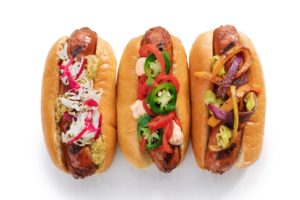Unhealthy Snacks For Your Pup
It’s sort of a no-brainer not to feed your pooch table scraps, desserts and all the other fat-filled foods that are common to the American diet. After all, though portion control can help somewhat, we, as a culture tend to be morbidly obese.
A CNN article from 2012 titled Obesity epidemic strikes US pets by Josh Levs found online at http://www.cnn.com/2012/02/03/living/overweight-pets/ aptly illustrates how we have transferred our own poor eating habits to our four-legged friends, and with detrimental results to their health,
At the time of the story in 2012, findings from an annual study conducted by The Association for Pet Obesity Prevention revealed that approximately 41 million dogs and 47 million cats were overweight or obese.
The U.S. Food and Drug Administration’s Center for Veterinary Medicine, notes the diseases seen among obese pets ‘are eerily similar to those reported for people,’ according to Levs.
Many owners are unaware their pets are overweight. The study found that 22% of dog owners and 15% of cat owners characterized their pets as normal weight when the animals were actually overweight.
Feeding your pets doughnuts, cake, candy, cheese puffs and the like are a definite no no. You and your kids probably shouldn’t be eating them either, for that matter, or only in extreme moderation.
Just in case you don’t already know the common foods that are considered poisons for cats and dogs here is a list provided by the experts at the American Society for the Prevention of Cruelty to Animals (ASPCA):
The top toxic people foods to avoid feeding your pet.
As always, if you suspect your pet has eaten any of the following foods, please note the amount ingested and contact your veterinarian or the ASPCA Animal Poison Control Center at (888) 426-4435.
Alcohol
Alcoholic beverages and food products containing alcohol can cause vomiting, diarrhea, decreased coordination, central nervous system depression, difficulty breathing, tremors, abnormal blood acidity, coma and even death. Under no circumstances should your pet be given any alcohol. If you suspect that your pet has ingested alcohol, contact your veterinarian or the ASPCA Animal Poison Control Center immediately.
Alcoholic beverages and food products containing alcohol can cause vomiting, diarrhea, decreased coordination, central nervous system depression, difficulty breathing, tremors, abnormal blood acidity, coma and even death. Under no circumstances should your pet be given any alcohol. If you suspect that your pet has ingested alcohol, contact your veterinarian or the ASPCA Animal Poison Control Center immediately.
Avocado
Avocado is primarily a problem for birds, rabbits, donkeys, horses, and ruminants including sheep and goats. The biggest concern is for cardiovascular damage and death in birds. Horses, donkeys and ruminants frequently get swollen, edematous head and neck.
Avocado is primarily a problem for birds, rabbits, donkeys, horses, and ruminants including sheep and goats. The biggest concern is for cardiovascular damage and death in birds. Horses, donkeys and ruminants frequently get swollen, edematous head and neck.
Chocolate, Coffee and Caffeine
These products all contain substances called methylxanthines, which are found in cacao seeds, the fruit of the plant used to make coffee, and in the nuts of an extract used in some sodas. When ingested by pets, methylxanthines can cause vomiting and diarrhea, panting, excessive thirst and urination, hyperactivity, abnormal heart rhythm, tremors, seizures and even death. Note that darker chocolate is more dangerous than milk chocolate. White chocolate has the lowest level of methylxanthines, while baking chocolate contains the highest.
These products all contain substances called methylxanthines, which are found in cacao seeds, the fruit of the plant used to make coffee, and in the nuts of an extract used in some sodas. When ingested by pets, methylxanthines can cause vomiting and diarrhea, panting, excessive thirst and urination, hyperactivity, abnormal heart rhythm, tremors, seizures and even death. Note that darker chocolate is more dangerous than milk chocolate. White chocolate has the lowest level of methylxanthines, while baking chocolate contains the highest.
Citrus
The stems, leaves, peels, fruit and seeds of citrus plants contain varying amounts of citric acid, essential oils that can cause irritation and possibly even central nervous system depression if ingested in significant amounts. Small doses, such as eating the fruit, are not likely to present problems beyond minor stomach upset.
The stems, leaves, peels, fruit and seeds of citrus plants contain varying amounts of citric acid, essential oils that can cause irritation and possibly even central nervous system depression if ingested in significant amounts. Small doses, such as eating the fruit, are not likely to present problems beyond minor stomach upset.
Coconut and Coconut Oil
When ingested in small amounts, coconut and coconut-based products are not likely to cause serious harm to your pet. The flesh and milk of fresh coconuts do contain oils that may cause stomach upset, loose stools or diarrhea. Because of this, we encourage you to use caution when offering your pets these foods. Coconut water is high in potassium and should not be given to your pet.
When ingested in small amounts, coconut and coconut-based products are not likely to cause serious harm to your pet. The flesh and milk of fresh coconuts do contain oils that may cause stomach upset, loose stools or diarrhea. Because of this, we encourage you to use caution when offering your pets these foods. Coconut water is high in potassium and should not be given to your pet.
Grapes and Raisins
Although the toxic substance within grapes and raisins is unknown, these fruits can cause kidney failure. Until more information is known about the toxic substance, it is best to avoid feeding grapes and raisins to dogs.
Although the toxic substance within grapes and raisins is unknown, these fruits can cause kidney failure. Until more information is known about the toxic substance, it is best to avoid feeding grapes and raisins to dogs.
Macadamia Nuts
Macadamia nuts can cause weakness, depression, vomiting, tremors and hyperthermia in dogs. Signs usually appear within 12 hours of ingestion and can last approximately 12 to 48 hours.
Macadamia nuts can cause weakness, depression, vomiting, tremors and hyperthermia in dogs. Signs usually appear within 12 hours of ingestion and can last approximately 12 to 48 hours.
Milk and Dairy
Because pets do not possess significant amounts of lactase (the enzyme that breaks down lactose in milk), milk and other dairy-based products cause them diarrhea or other digestive upset.
Because pets do not possess significant amounts of lactase (the enzyme that breaks down lactose in milk), milk and other dairy-based products cause them diarrhea or other digestive upset.
Nuts
Nuts, including almonds, pecans, and walnuts, contain high amounts of oils and fats. The fats can cause vomiting and diarrhea, and potentially pancreatitis in pets.
Nuts, including almonds, pecans, and walnuts, contain high amounts of oils and fats. The fats can cause vomiting and diarrhea, and potentially pancreatitis in pets.
Onions, Garlic, Chives
These vegetables and herbs can cause gastrointestinal irritation and could lead to red blood cell damage. Although cats are more susceptible, dogs are also at risk if a large enough amount is consumed. Toxicity is normally diagnosed through history, clinical signs and microscopic confirmation of Heinz bodies.
These vegetables and herbs can cause gastrointestinal irritation and could lead to red blood cell damage. Although cats are more susceptible, dogs are also at risk if a large enough amount is consumed. Toxicity is normally diagnosed through history, clinical signs and microscopic confirmation of Heinz bodies.
Raw/Undercooked Meat, Eggs and Bones
Raw meat and raw eggs can contain bacteria such as Salmonella and E. coli that can be harmful to pets and humans. Raw eggs contain an enzyme called avidin that decreases the absorption of biotin (a B vitamin), which can lead to skin and coat problems. Feeding your pet raw bones may seem like a natural and healthy option that might occur if your pet lived in the wild. However, this can be very dangerous for a domestic pet, who might choke on bones, or sustain a grave injury should the bone splinter and become lodged in or puncture your pet’s digestive tract.
Raw meat and raw eggs can contain bacteria such as Salmonella and E. coli that can be harmful to pets and humans. Raw eggs contain an enzyme called avidin that decreases the absorption of biotin (a B vitamin), which can lead to skin and coat problems. Feeding your pet raw bones may seem like a natural and healthy option that might occur if your pet lived in the wild. However, this can be very dangerous for a domestic pet, who might choke on bones, or sustain a grave injury should the bone splinter and become lodged in or puncture your pet’s digestive tract.
Salt and Salty Snack Foods
Large amounts of salt can produce excessive thirst and urination, or even sodium ion poisoning in pets. Signs that your pet may have eaten too many salty foods include vomiting, diarrhea, depression, tremors, elevated body temperature, seizures and even death. As such, we encourage you to avoid feeding salt-heavy snacks like potato chips, pretzels, and salted popcorn to your pets.
Large amounts of salt can produce excessive thirst and urination, or even sodium ion poisoning in pets. Signs that your pet may have eaten too many salty foods include vomiting, diarrhea, depression, tremors, elevated body temperature, seizures and even death. As such, we encourage you to avoid feeding salt-heavy snacks like potato chips, pretzels, and salted popcorn to your pets.
Xylitol
Xylitol is used as a sweetener in many products, including gum, candy, baked goods and toothpaste. It can cause insulin release in most species, which can lead to liver failure. The increase in insulin leads to hypoglycemia (lowered sugar levels). Initial signs of toxicosis include vomiting, lethargy and loss of coordination. Signs can progress to seizures. Elevated liver enzymes and liver failure can be seen within a few days.
Xylitol is used as a sweetener in many products, including gum, candy, baked goods and toothpaste. It can cause insulin release in most species, which can lead to liver failure. The increase in insulin leads to hypoglycemia (lowered sugar levels). Initial signs of toxicosis include vomiting, lethargy and loss of coordination. Signs can progress to seizures. Elevated liver enzymes and liver failure can be seen within a few days.
Yeast Dough
Yeast dough can rise and cause gas to accumulate in your pet’s digestive system. This can be painful and can cause the stomach to bloat, and potentially twist, becoming a life threatening emergency. The yeast produce ethanol as a by-product and a dog ingesting raw bread dough can become drunk (See alcohol).
Yeast dough can rise and cause gas to accumulate in your pet’s digestive system. This can be painful and can cause the stomach to bloat, and potentially twist, becoming a life threatening emergency. The yeast produce ethanol as a by-product and a dog ingesting raw bread dough can become drunk (See alcohol).
If you have any concerns or questions regarding your pet’s optimal diet you should talk it over with his or her Clifton Park area veterinarian.


